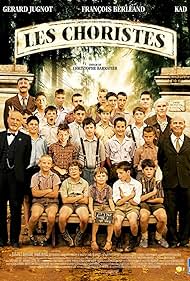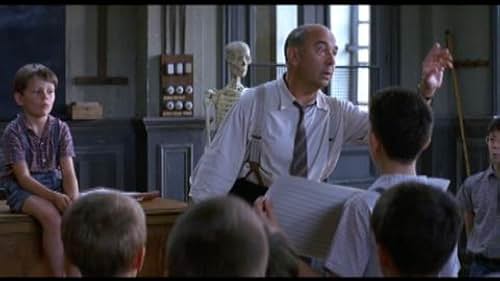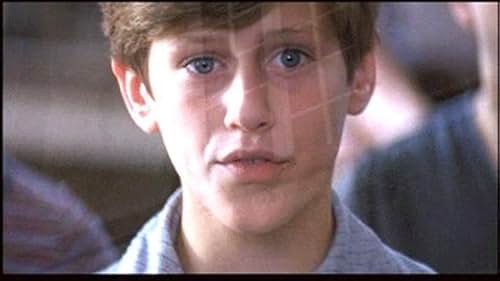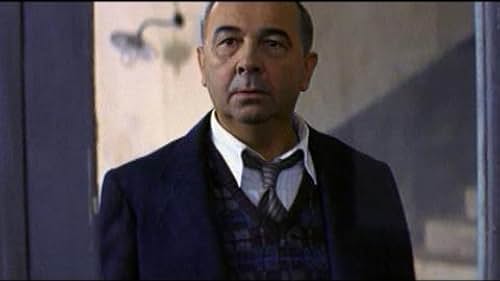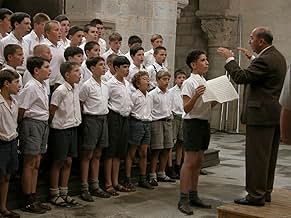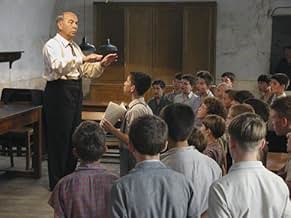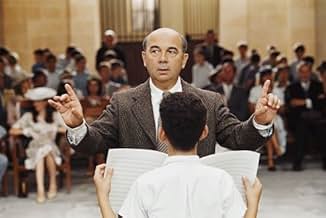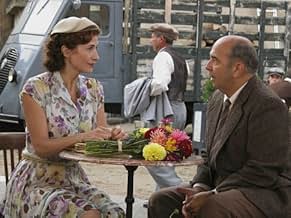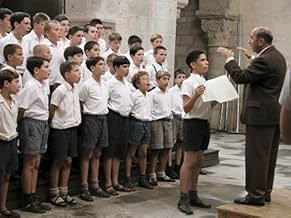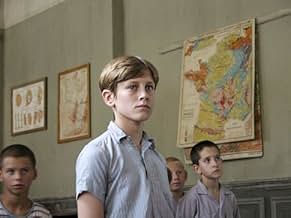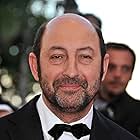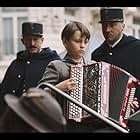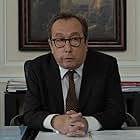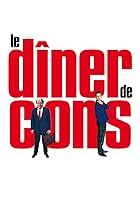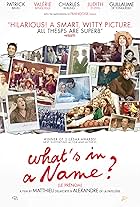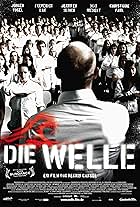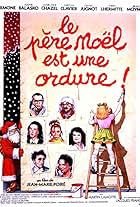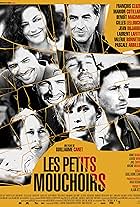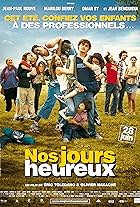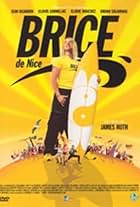Pierre, a successful orchestra conductor, returns home when his mother dies. He stumbles upon an old diary and recollects the childhood school memories and his music teacher Clement Mathieu.Pierre, a successful orchestra conductor, returns home when his mother dies. He stumbles upon an old diary and recollects the childhood school memories and his music teacher Clement Mathieu.Pierre, a successful orchestra conductor, returns home when his mother dies. He stumbles upon an old diary and recollects the childhood school memories and his music teacher Clement Mathieu.
- Nominated for 2 Oscars
- 12 wins & 24 nominations total
Storyline
Did you know
- TriviaActor, co-producer Gérard Jugnot mortgaged his Paris apartment to help finance the film. The bet paid off, and he ended up making over 5 million euros for 'Les Choristes' as actor and co-producer. He earned the title of the highest-paid French actor in 2004, overtaking Jean Reno and Gérard Depardieu.
- GoofsDuring the auditions, Mathieu sends pupils to the right or to the left showing the direction by his hand. When directing Ricoeur, who sings "I've got tobacco in my pouch", to the left (at 33:06 to 33:07) he first moves his hand to his right, which some cite as an error while others cite it as a flourish, but then sweeps or hooks his hand left.
- Quotes
Pierre Morhange adulte: Pepinot was right all along. Clement Mathieu was fired on a Saturday.
- ConnectionsFeatured in Interdit aux plus de 13 ans (2004)
- SoundtracksLes Choristes
Lyrics By Christophe Barratier
Music By Bruno Coulais
Orchestra: Bulgarian Symphony Orchestra-Sif 309, Conductor Deyan Pavlov'
© 2004 Warner Bros. Records,WEA Music (p) 2004 Galatée Films
Featured review
Two Continental European films with campus setting are on show right now in town: Spanish director Pedro Almodóvar's "La mala educación" and French director Christophe Barratier's "Les choristes". However, the former deals with the devil which is pretty disturbing while the latter the angels that touches the viewers' heart and soul. It blows in new fresh air into the cinema world.
People may associate the film with the 1945 production "La cage aux rossignols". Yet, "Au revoir les enfants", "La gloire de mon père", "Le château de ma mere", "Nuovo cinema Paradiso" and the literature namely "Le Petit Chose" by Alphonse Daudet and the hugely popular series of René Goscinny's "Le Petit Nicolas" were rushing into my head when the film rolled on. They all share a number of common features: younger carefree days, reminiscence, scenic countryside, pastoral living etc, they are all ingredients of French fresh (salad) movie, warm, humane and unforgettable. The genre is perpetually popular and it is ever-lasting. Strangely the subject matter though is related to "To Sir, with Love", "Mr. Holland's Opus", they didn't come up to my mind immediately.
French people are capable of producing movies or books with nostalgic ideas, the power again captures the world's heart. A country with long history or brilliant history provides much space for artists, France is one of them. Perhaps the French have no incentive to push forward like the Brits or Americans or they are pessimistic about the future or they lack funds, many the French artists (of various art form) keep looking into history for inspiration. Many French global blockbusters are filmed in nostalgic background setting, "Amélie" is the one in the 50s or early 60s. Cruelly truthful is if we compare the development (in most areas) of the developed nations on the west and east Atlantic coasts, the UK and the USA are exactly more advanced.
Pierre, Pépinot, Le Querrec, spectacled Boniface and all the other children form not only a choir but an angelic choir. The boys' angelic voices has resounded inside my head for pretty long time. The angels rekindle Clément Mathieu's abandoned hope on music and hope again falls onto these young souls. On top of it, he is the unsung hero on the making of the world famous conductor Pierre Morhange. Mondain, apparently sexually harassed, is not a incurable boy but a boy in his quest for love. Mathieu wants to carry out his "experiment" on him. And the young boy knows the class tutor is a kind and reasonable teacher. His smile to Mathieu before he is pulled away by the police tells it all.
Mathieu believes in moral education (or educating children in love) which is entirely different from iron-handed Rachin's hard-line pedagogical conviction and administration. Should time be given, Mondain would find his way out from the excruciating self-destruction. Just a side thought: Hong Kong educators should have more thought on dealing with "problem students", from time to time what these young people need is a tender light guiding them onto a path which they can have satisfaction and security. Well, we are somehow regressing now.
People may associate the film with the 1945 production "La cage aux rossignols". Yet, "Au revoir les enfants", "La gloire de mon père", "Le château de ma mere", "Nuovo cinema Paradiso" and the literature namely "Le Petit Chose" by Alphonse Daudet and the hugely popular series of René Goscinny's "Le Petit Nicolas" were rushing into my head when the film rolled on. They all share a number of common features: younger carefree days, reminiscence, scenic countryside, pastoral living etc, they are all ingredients of French fresh (salad) movie, warm, humane and unforgettable. The genre is perpetually popular and it is ever-lasting. Strangely the subject matter though is related to "To Sir, with Love", "Mr. Holland's Opus", they didn't come up to my mind immediately.
French people are capable of producing movies or books with nostalgic ideas, the power again captures the world's heart. A country with long history or brilliant history provides much space for artists, France is one of them. Perhaps the French have no incentive to push forward like the Brits or Americans or they are pessimistic about the future or they lack funds, many the French artists (of various art form) keep looking into history for inspiration. Many French global blockbusters are filmed in nostalgic background setting, "Amélie" is the one in the 50s or early 60s. Cruelly truthful is if we compare the development (in most areas) of the developed nations on the west and east Atlantic coasts, the UK and the USA are exactly more advanced.
Pierre, Pépinot, Le Querrec, spectacled Boniface and all the other children form not only a choir but an angelic choir. The boys' angelic voices has resounded inside my head for pretty long time. The angels rekindle Clément Mathieu's abandoned hope on music and hope again falls onto these young souls. On top of it, he is the unsung hero on the making of the world famous conductor Pierre Morhange. Mondain, apparently sexually harassed, is not a incurable boy but a boy in his quest for love. Mathieu wants to carry out his "experiment" on him. And the young boy knows the class tutor is a kind and reasonable teacher. His smile to Mathieu before he is pulled away by the police tells it all.
Mathieu believes in moral education (or educating children in love) which is entirely different from iron-handed Rachin's hard-line pedagogical conviction and administration. Should time be given, Mondain would find his way out from the excruciating self-destruction. Just a side thought: Hong Kong educators should have more thought on dealing with "problem students", from time to time what these young people need is a tender light guiding them onto a path which they can have satisfaction and security. Well, we are somehow regressing now.
- How long is The Chorus?Powered by Alexa
Details
- Release date
- Countries of origin
- Official site
- Language
- Also known as
- Los coristas
- Filming locations
- Production companies
- See more company credits at IMDbPro
Box office
- Budget
- €5,500,000 (estimated)
- Gross US & Canada
- $3,635,164
- Opening weekend US & Canada
- $18,355
- Jan 16, 2005
- Gross worldwide
- $88,385,944
- Runtime1 hour 37 minutes
- Color
- Sound mix
- Aspect ratio
- 2.35 : 1
Contribute to this page
Suggest an edit or add missing content

